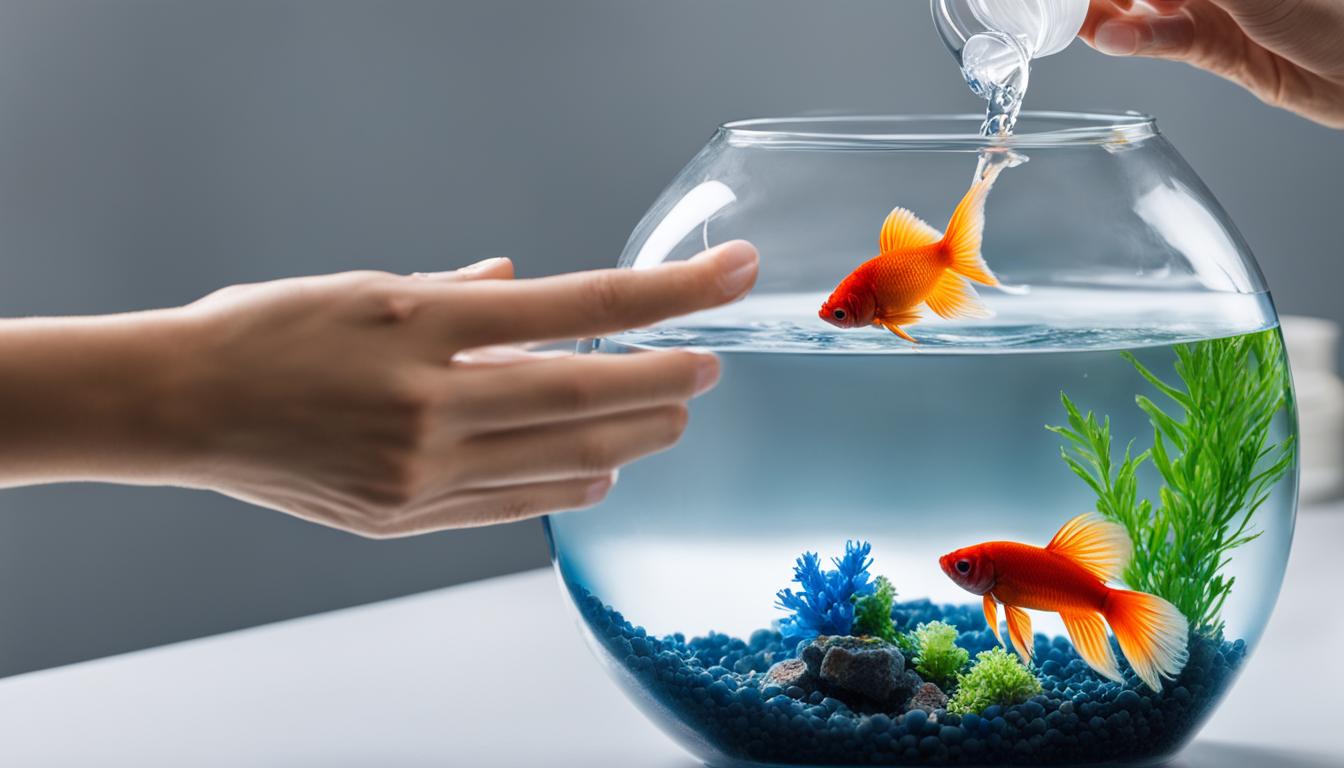Last Updated on 4 months by admin
If you’re a betta fish owner, you want to provide your fish with the best possible care. One of the most critical aspects of betta fish care is maintaining the right water conditions. By following the right steps, you can ensure that your betta fish lives in a healthy and clean environment.
In this comprehensive guide, we will take you through all the essential steps on how to treat water for your betta fish. From water quality to pH levels, we’ll provide you with tips and tricks to ensure that your betta fish thrives.
Key Takeaways
- Proper water treatment is essential for betta fish health and longevity.
- Betta fish have specific water parameter requirements, including temperature, pH level, and ammonia level.
- Keeping the water clean is crucial for the overall health of betta fish.
- Water conditioners play an essential role in maintaining optimal water conditions.
- Betta fish prefer slightly acidic water with a specific pH range.
Importance of Water Quality for Betta Fish
Water quality is a critical factor in maintaining a healthy and thriving betta fish. Poor water quality can lead to several health issues, including stress, fin rot, and even death. Therefore, as pet owners, it is our responsibility to provide our betta fish with the best possible environment to ensure their well-being. Here are some betta care tips for water that will help keep your fish happy and healthy:
Regular Water Changes
The first step in ensuring excellent water quality is to perform regular water changes. Betta fish require fresh and clean water, and changing the water frequently is vital in maintaining optimal conditions. As a general rule of thumb, aim to change 25% of the water in your fish tank every week. However, if you notice any significant changes in water parameters, such as an increase in ammonia levels, it’s best to perform a water change immediately.
Using a Filtration System
In addition to regular water changes, installing a filtration system is another essential betta care tip for water. A filtration system helps to remove debris, toxins, and other unwanted particles from the water, reducing the workload on the bacteria responsible for breaking down waste in the tank. With a filtration system in place, you can maintain good water quality without having to change the water as frequently.
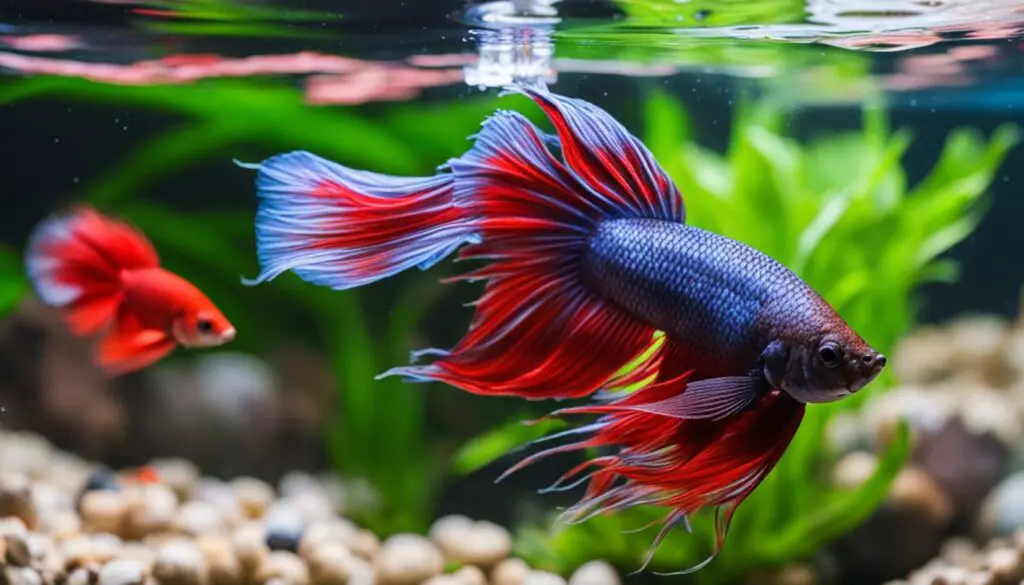
Monitoring Water Parameters
To maintain optimal water conditions, it’s crucial to monitor the water parameters regularly. Betta fish require specific water conditions, including temperature, pH level, and ammonia level. Monitoring these parameters will help you identify any issues early on and take corrective action before it’s too late. You can use a water testing kit to check the parameters of your water.
Substrate Maintenance
Another important betta care tip for water is to maintain the substrate in your tank. Waste particles can accumulate in the substrate if left unattended, leading to an increase in ammonia levels and other harmful elements in the water. Therefore, it’s crucial to clean the substrate regularly by vacuuming the debris from the bottom of the tank.
Conclusion
Maintaining excellent water quality is essential for the health and well-being of your betta fish. By following the tips mentioned above, you can ensure that your betta fish thrives in a clean and healthy environment. Remember to perform regular water changes, use a filtration system, monitor the water parameters, and maintain the substrate to keep your betta fish happy and healthy.
Understanding Betta Fish Water Parameters
Betta fish are tropical freshwater fish that require specific water parameters to thrive. Maintaining optimal conditions in their environment is essential for their health and longevity. In this section, we will delve into each parameter and explain how to monitor and maintain them within the ideal range.
Temperature
The temperature of the water is one of the most critical parameters for betta fish. They require warm water with a consistent temperature between 78-80 °F (25-27 °C) to survive and thrive. Any significant changes in temperature can cause stress and even lead to life-threatening illnesses. You can monitor the water temperature using a thermometer and adjust it by using a heater if needed.
pH Level
The pH level of betta fish water should be between 6.5-7.5 to maintain a healthy environment. You can measure the pH level using a testing kit, and if it falls outside of the ideal range, you can adjust it using pH adjusters available in the market. It is essential to note, however, that sudden changes in pH levels can be harmful to betta fish, so it’s crucial to make gradual adjustments over time.
Ammonia Level
Ammonia is a toxic substance that can harm betta fish if it accumulates in their water. Regular water changes and filtration systems can help to control the ammonia level in the water. You can also use testing kits to monitor the level of ammonia in the water and adjust it using water conditioners if necessary.
Keeping track of the water parameters is crucial for betta fish care . You can use a logbook or an app and record the readings to ensure that the water remains fresh and healthy.
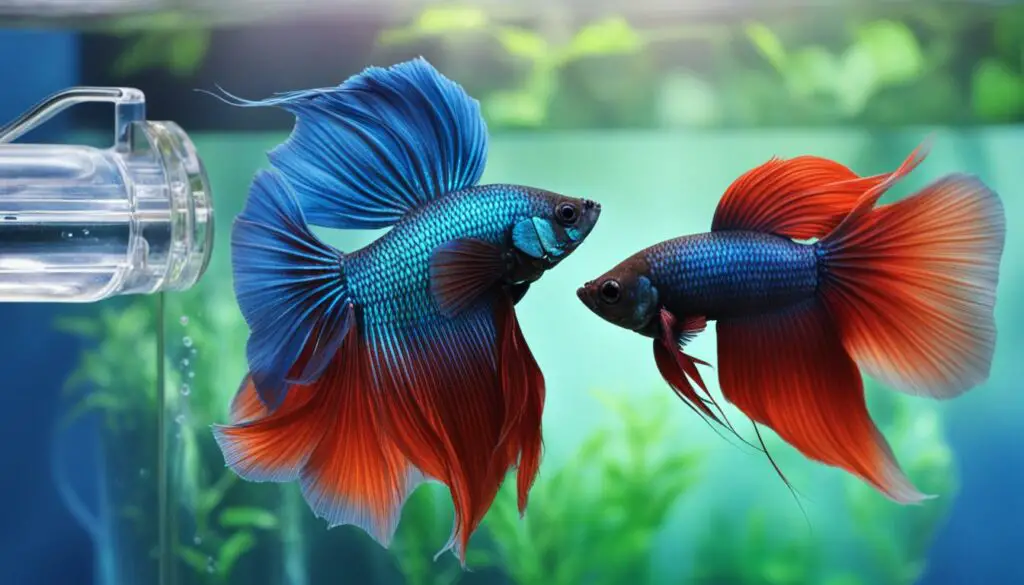
“Maintaining optimal conditions in their environment is essential for their health and longevity.”
Tips for Keeping Betta Fish Water Clean
Maintaining clean water is essential for the overall health of betta fish. By following a few simple steps, you can keep your betta fish happy and healthy:
- Perform regular water changes: Betta fish require frequent water changes to remove toxins and maintain a healthy environment. Change 25% of the water in the tank every two weeks or 50% every four weeks to keep the water clean and fresh.
- Invest in a good filtration system: A good filtration system helps remove harmful waste and debris from the water. Choose a filter that is suitable for your tank size and follow the manufacturer’s instructions for cleaning and maintenance.
- Clean the substrate: The substrate at the bottom of the tank can collect uneaten food and waste. Use a gravel vacuum to remove any debris from the substrate during water changes.
- Monitor water temperature: Betta fish thrive in water temperatures between 76-82°F. Use a thermometer to ensure that the water temperature remains within the ideal range.
- Avoid overfeeding: Overfeeding your betta fish can lead to excess waste and dirty water. Feed your betta fish a small amount of food no more than twice a day.
- Keep the tank out of direct sunlight: Direct sunlight can cause excessive algae growth, leading to cloudy water. Keep the tank in a shaded area to prevent this problem.
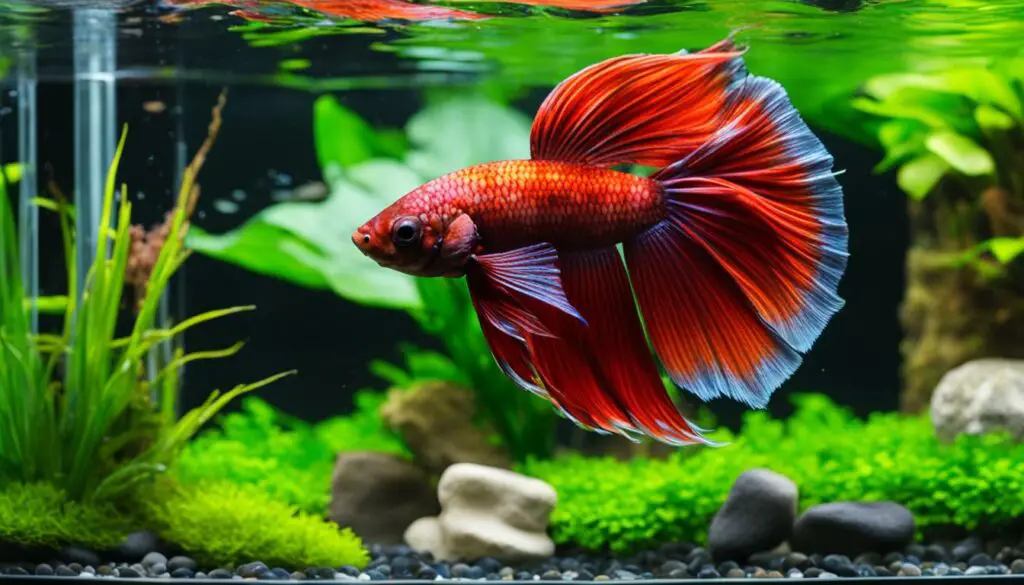
Tip: When performing water changes, use a water conditioner to neutralize any harmful chemicals in the tap water. This will help prevent stress and illness in your betta fish.
By following these simple tips, you can keep your betta fish water clean and provide your fish with a healthy environment for a happy life.
The Role of Water Conditioners in Betta Fish Care
Betta fish require clean and healthy water to thrive. However, tap water contains chemicals such as chlorine, which can harm your fish. This is where water conditioners come in.
A water conditioner is a chemical solution that removes harmful chemicals from tap water and neutralizes it, making it safe for your betta fish to live in.
When choosing a water conditioner for your betta fish, opt for one that removes chlorine and chloramine and detoxifies ammonia and heavy metals. It’s also essential to ensure that the conditioner is formulated specifically for betta fish.
Benefits of Using Water Conditioners
Using water conditioners has several benefits for your betta fish, including:
- Removing harmful chemicals and toxins from tap water
- Neutralizing chlorine, chloramine, and ammonia
- Improving water quality for better fish health and growth
- Reducing fish stress by creating a suitable environment for them
Water conditioners are easy to use and are available in liquid, tablet, or powder form. Just add the recommended dose to your tap water before adding it to your betta fish tank.
Remember, avoiding the use of water conditioners can lead to health problems for your betta fish, including stress, fin rot, and other diseases.
Conclusion
Water conditioners are crucial for maintaining the health and well-being of your betta fish. They remove harmful chemicals and create a suitable environment for your fish to thrive. Choose a conditioner that’s specifically formulated for betta fish, and always use it when treating your tap water before adding it to the fish tank.
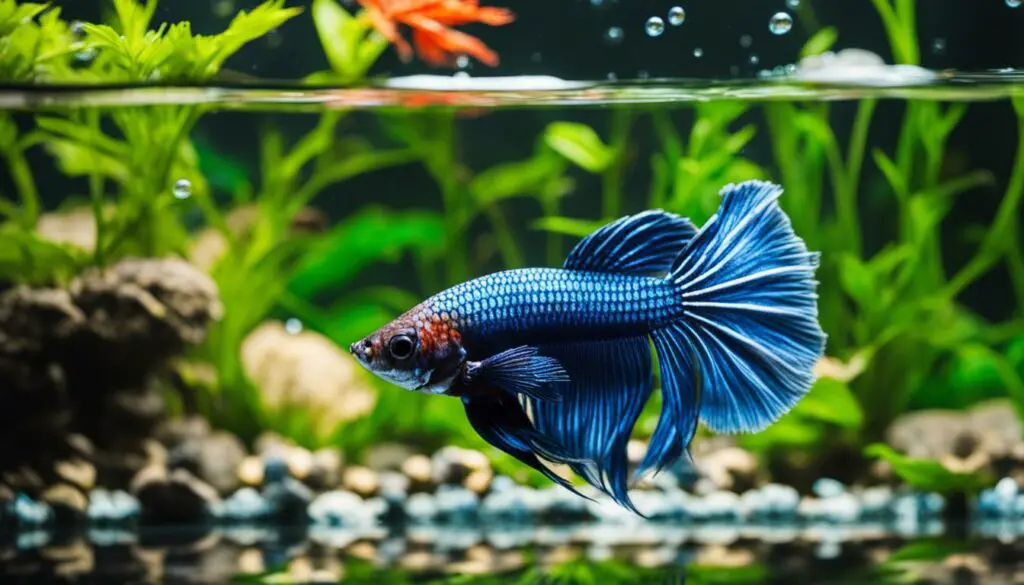
Adjusting Water pH Levels for Betta Fish
Betta fish require specific water pH levels for optimal health and well-being. The ideal pH range for betta fish water is between 6.5 and 7.5, slightly acidic water (pH below 7) being preferred by most betta fish.
Keeping the pH levels stable is crucial, as fluctuating pH levels can cause stress to your betta fish and lead to health issues.
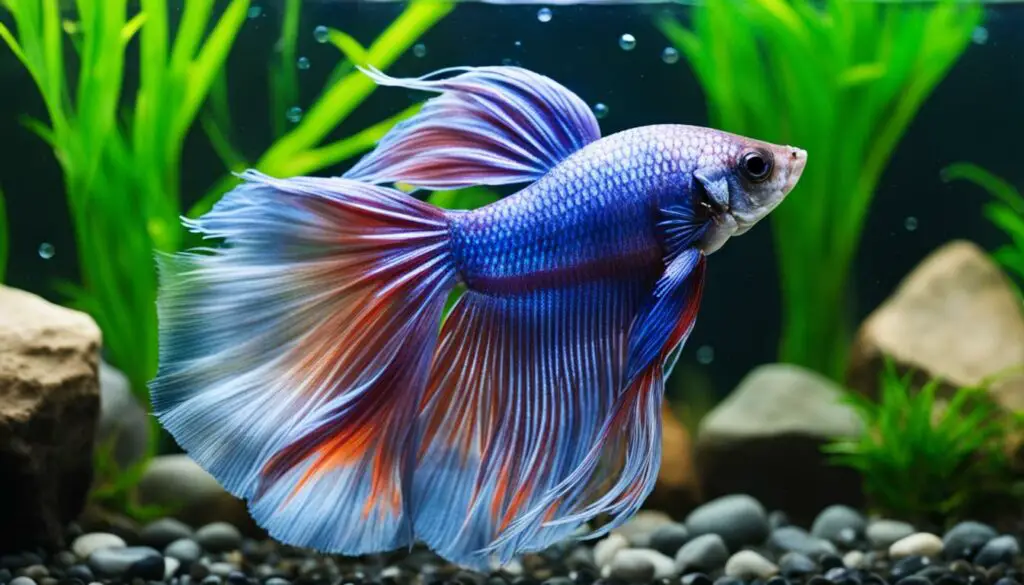
Monitoring the pH levels regularly is essential. You can use a pH test kit to measure the pH level of your betta fish tank.
Adjusting the pH Levels
If the pH level is too high or too low, there are ways to adjust it to the ideal range.
- Adding driftwood or almond leaves: These natural materials can lower the pH levels over time. Make sure to use untreated driftwood and almond leaves without any pesticides or contaminants.
- Using pH-lowering solutions: pH-lowering solutions are available at pet stores and can be added to the water to adjust the pH levels. However, be cautious not to overdose, as too much of this solution can harm your betta fish.
- Using reverse osmosis (RO) water: RO water is naturally low in pH and can be used to lower the pH levels in your betta fish tank. Mix it with tap water to achieve the ideal pH range for betta fish.
Maintaining the pH Levels
After adjusting the pH levels, it’s essential to maintain them in the ideal range to promote a healthy environment for your betta fish.
- Test the pH levels regularly: Continuously monitor the pH levels to ensure they remain in the ideal range.
- Avoid overfeeding: Overfeeding can cause an increase in ammonia levels, leading to a decrease in pH levels. Feed your betta fish small amounts of food multiple times a day, and remove any uneaten food after a few minutes.
- Perform regular water changes: Regular water changes will remove any excess waste and prevent the buildup of harmful chemicals in the water that can affect the pH levels.
With these tips, you can maintain the ideal pH levels for your betta fish and provide them with a healthy and stress-free environment.
Step-by-Step Guide to Treating Betta Fish Water
Ensuring that your betta fish lives in a clean and healthy environment is essential for its well-being and longevity. Here is a step-by-step guide on how to treat betta fish water:
Step 1: Preparing the Water
Begin by filling a clean container with tap water and let it sit for at least 24 hours. This allows any chlorine or chloramine in the water to dissipate, which can be harmful to your betta fish. You can also use a water conditioner to neutralize the chlorine or chloramine.
Step 2: Conditioning the Water
Using a water conditioner is crucial for removing harmful chemicals from the tap water and maintaining water quality. Follow the instructions on the conditioner label for the appropriate dosage and add it to the water. Wait for the conditioner to fully dissolve before using the water.
Step 3: Monitoring the Water Parameters
It’s important to monitor the water parameters to ensure the ideal conditions for your betta fish. Use a reliable water testing kit to measure the temperature, pH level, and ammonia level. Record the readings in a logbook to track any changes.
Step 4: Maintaining Water Quality
Regular water changes are crucial for maintaining water quality. Betta fish require clean water, and a good rule of thumb is to change about 25% to 50% of the water in the tank every week. Use a siphon to remove any debris from the substrate and vacuum it to keep it clean.
Step 5: Checking the Filtration System
The filtration system is essential in keeping the water clean and clear. Check the filter for any clogs or debris buildup. Replace the filter cartridges as needed, and clean the filter as per the manufacturer’s instructions.
By following these simple steps, you can ensure that your betta fish lives in a healthy and clean environment. Remember to test the water parameters regularly and make adjustments as needed. By doing so, your betta fish will thrive and live a long, happy life.
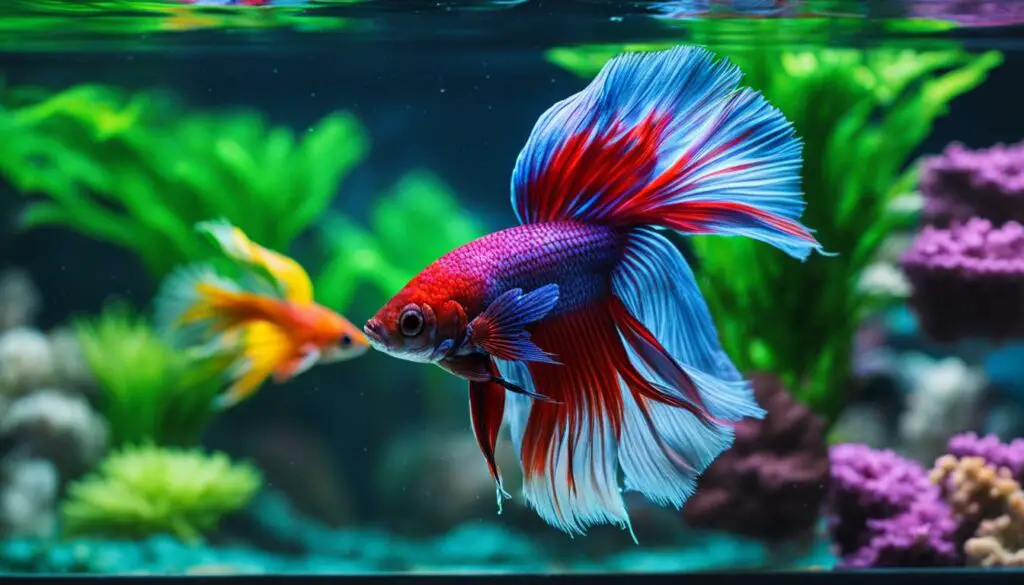
Troubleshooting Common Betta Fish Water Issues
Despite your best efforts to maintain optimal water conditions for your betta fish, problems may still arise from time to time. Here are some common issues you may encounter and what you can do to fix them:
Cloudy Water
Cloudy water is a common problem that can be caused by overfeeding, excess waste build-up, or bacteria blooms. To fix cloudy water, do the following:
- Reduce feeding and remove any excess food.
- Perform a partial water change, making sure to vacuum the substrate to remove any waste build-up.
- Consider adding a bacterial supplement to help balance the water chemistry.
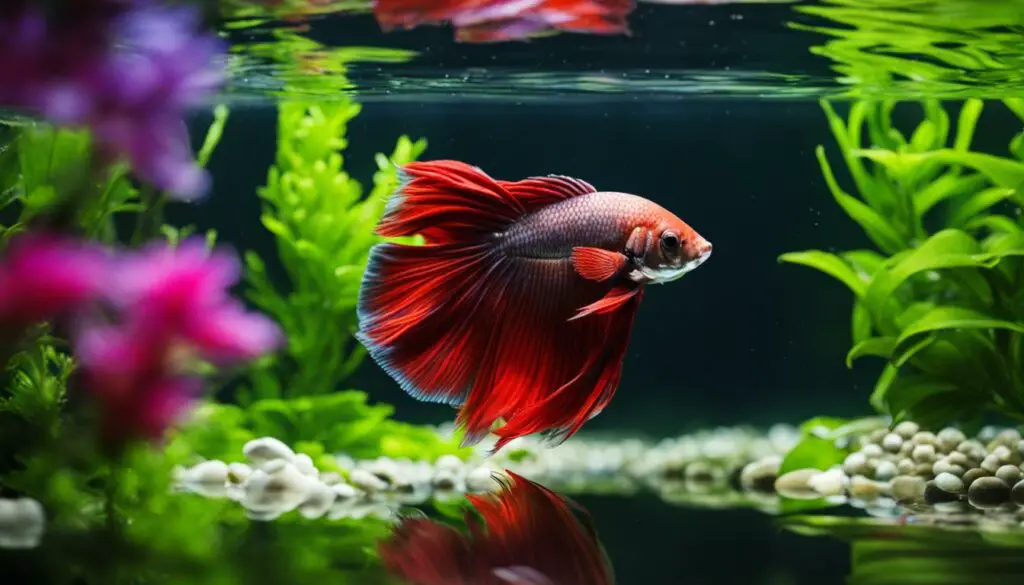
Algae Growth
Algae growth is another common problem that is caused by excess light and nutrients in the water. To fix algae growth, try the following:
- Reduce the amount of light your tank receives. Betta fish require only 8-12 hours of light per day.
- Avoid overfeeding and perform regular water changes to reduce nutrient build-up.
- Consider adding live plants to your tank, as they can help absorb excess nutrients and compete with algae for resources.
Ammonia Spikes
Ammonia spikes are a serious problem that can be caused by overfeeding, excess waste build-up, or a malfunctioning filter. To fix ammonia spikes, take the following actions:
- Perform an immediate partial water change of at least 50%.
- Check your filter to ensure it is running correctly and clean or replace the filter media if necessary.
- Reduce feeding and make sure to remove any excess food.
- Consider adding a bacterial supplement to help break down excess waste and neutralize ammonia.
pH Swings
Betta fish are sensitive to pH swings and can become stressed or sick if the water chemistry changes too rapidly. To fix pH swings, take the following actions:
- Monitor the pH levels regularly and make sure they stay within the ideal range for betta fish (6.5 – 7.5).
- If the pH levels are too low, try adding an aquarium buffer to raise the pH slowly.
- If the pH levels are too high, try adding organic matter or using peat moss to reduce the pH naturally.
By troubleshooting and fixing these common betta fish water issues, you can ensure your fish thrives in a healthy and clean environment. Remember to always monitor your water conditions and take action promptly if you notice any changes or problems arising.
Conclusion
Now that you have a comprehensive guide on how to treat betta fish water, you can ensure that your fish thrives in a healthy and clean environment. By following the steps outlined in this guide, you can prevent common water issues and promote optimal water conditions for your betta fish.
Remember to maintain the quality of water by monitoring and adjusting the water parameters, keeping the water clean, and using water conditioners. With these tips, you can provide your betta fish with the best possible environment for growth and longevity.
Implement these tips today and watch your betta fish thrive in clean and healthy water. Thank you for reading our guide on how to treat betta fish water!
FAQ
What are the essential steps for treating betta fish water?
The essential steps for treating betta fish water include preparing the water, conditioning it with a water conditioner, monitoring water parameters, and performing regular water changes.
Why is water quality important for betta fish?
Water quality is crucial for the well-being of betta fish as it directly impacts their health. Proper water quality helps prevent diseases, promotes growth, and enhances their overall vitality.
What are the specific water parameters for betta fish?
Betta fish require a temperature range of 78-80°F, a pH level between 6.5-7.5, and ammonia levels that are consistently at zero parts per million (ppm).
How can I keep my betta fish’s water clean?
To keep your betta fish’s water clean, you should perform regular water changes, use a filtration system appropriate for your tank size, and maintain the cleanliness of the substrate.
What role do water conditioners play in betta fish care?
Water conditioners are essential in betta fish care as they remove harmful chemicals and neutralize tap water, making it safe for your fish to live in.
How can I adjust the pH levels of the water for my betta fish?
To adjust the pH levels for your betta fish, you can use pH-adjusting products specifically designed for aquarium use. Follow the instructions carefully and monitor the pH levels regularly.
Can you provide a step-by-step guide to treating betta fish water?
Certainly! To treat betta fish water, you need to prepare the water, add a water conditioner, monitor and maintain the water parameters, and perform regular water changes. You can find a detailed step-by-step guide in our comprehensive water treatment section.
What are common betta fish water issues and how can I troubleshoot them?
Common betta fish water issues include cloudy water, high ammonia levels, and pH fluctuations. To troubleshoot these issues, you can perform partial water changes, test and adjust water parameters, and ensure proper filtration and maintenance.
How can I ensure the best water quality for my betta fish?
By following the steps outlined in our guide and implementing proper water treatment techniques, you can provide your betta fish with the best possible water quality. This includes regular maintenance, monitoring parameters, and addressing any issues promptly.
What can I do to promote the wellbeing of my betta fish?
To promote the wellbeing of your betta fish, you should maintain optimal water quality, provide a suitable environment with proper tank size and decorations, offer a balanced diet, and ensure they have a stress-free environment with appropriate lighting and tank mates.

